SDG NEWSLETTER – OCTOBER 2023
We are excited to announce the successful launch of the SDG-driven Tech Innovation Ecosystems consortium project and its mapping study at the GSG Global Impact Summit 2023, where over 1000 impact leaders from 60+ countries gathered together in Malaga, Spain on October 2-3, 2023.
During the Summit, we organized a total of 2 panel sessions and 1 workshop dedicated to the consortium project looking at the different facets of SDG-driven tech innovation ecosystems:
- SDG-Driven Tech Innovation Ecosystems to Accelerate Progress Toward the SDGs, where the consortium partners presented the mapping study and facilitated the panel discussion.
- Tech-Innovation: Perspectives from Diverse Ecosystems and Geographies, where distinguished guest speakers provided insights into SDG tech innovation ecosystems from various regions (see IFIE’s newsletter section for more information.)
- Workshop: Collaborating to strengthen impact-tech ecosystems in service of the SDGs, where consortium partners led roundtable discussions with Summit participants on specific topics (see MAZE’s newsletter section for more information.)
The launched mapping study delves into the policies, initiatives, actors, and resources shaping the local ecosystem in France, Israel, Italy, Portugal, and 3 CEE countries (Lithuania, Estonia, and Poland). Its goal is to identify the key strengths and barriers in their respective ecosystems, with a view to sharing and building best practices.
The study introduces the SDG-driven Tech Innovation Ecosystems Building Blocks Framework, outlining the essential features that can accelerate the SDGs implementation. Key findings reveal that approximately 19,000 startups and digital innovation solutions across seven countries, but the SDGs are not clearly articulated in public-facing language by national governments despite being referenced in EU documents.
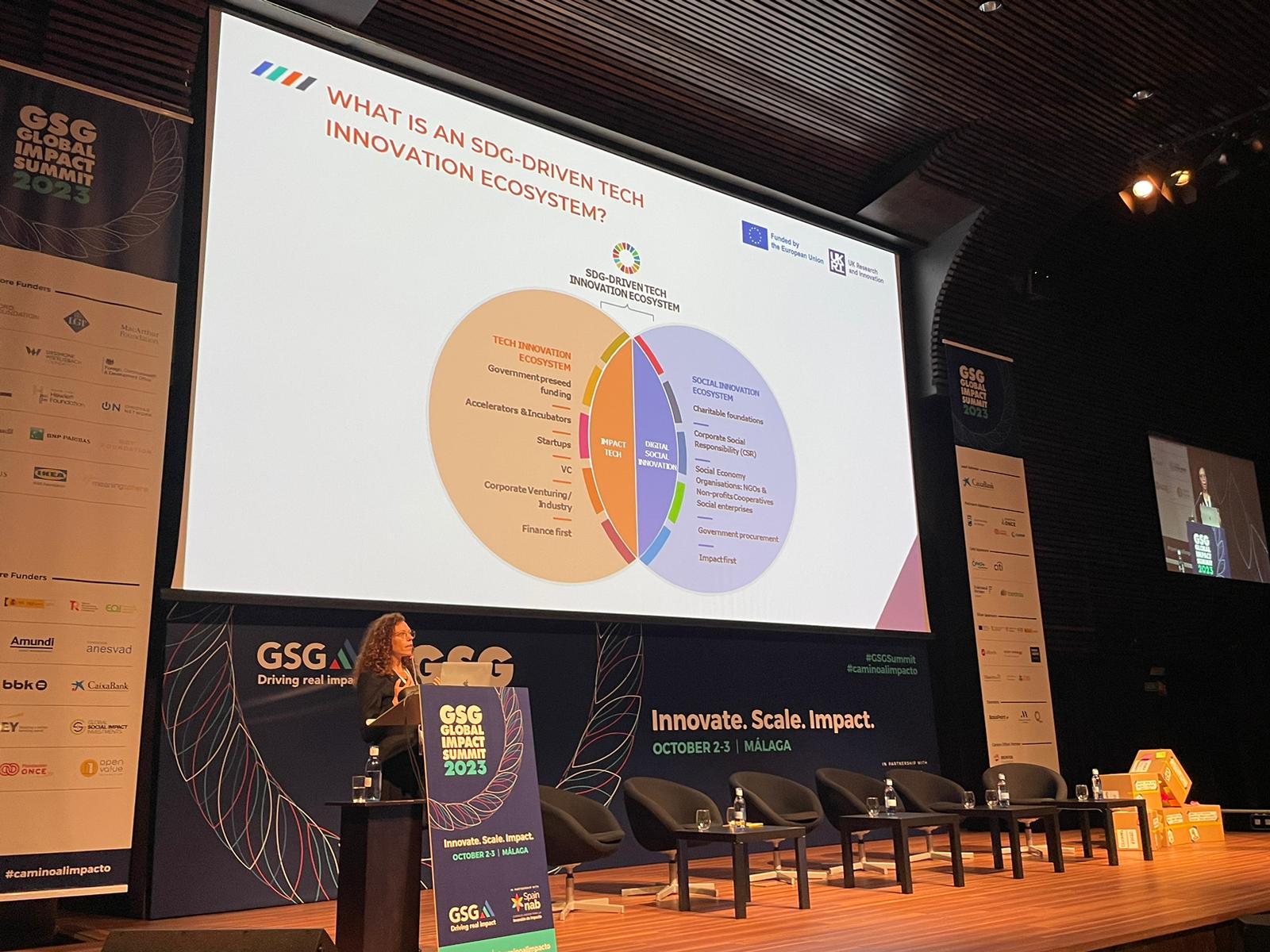
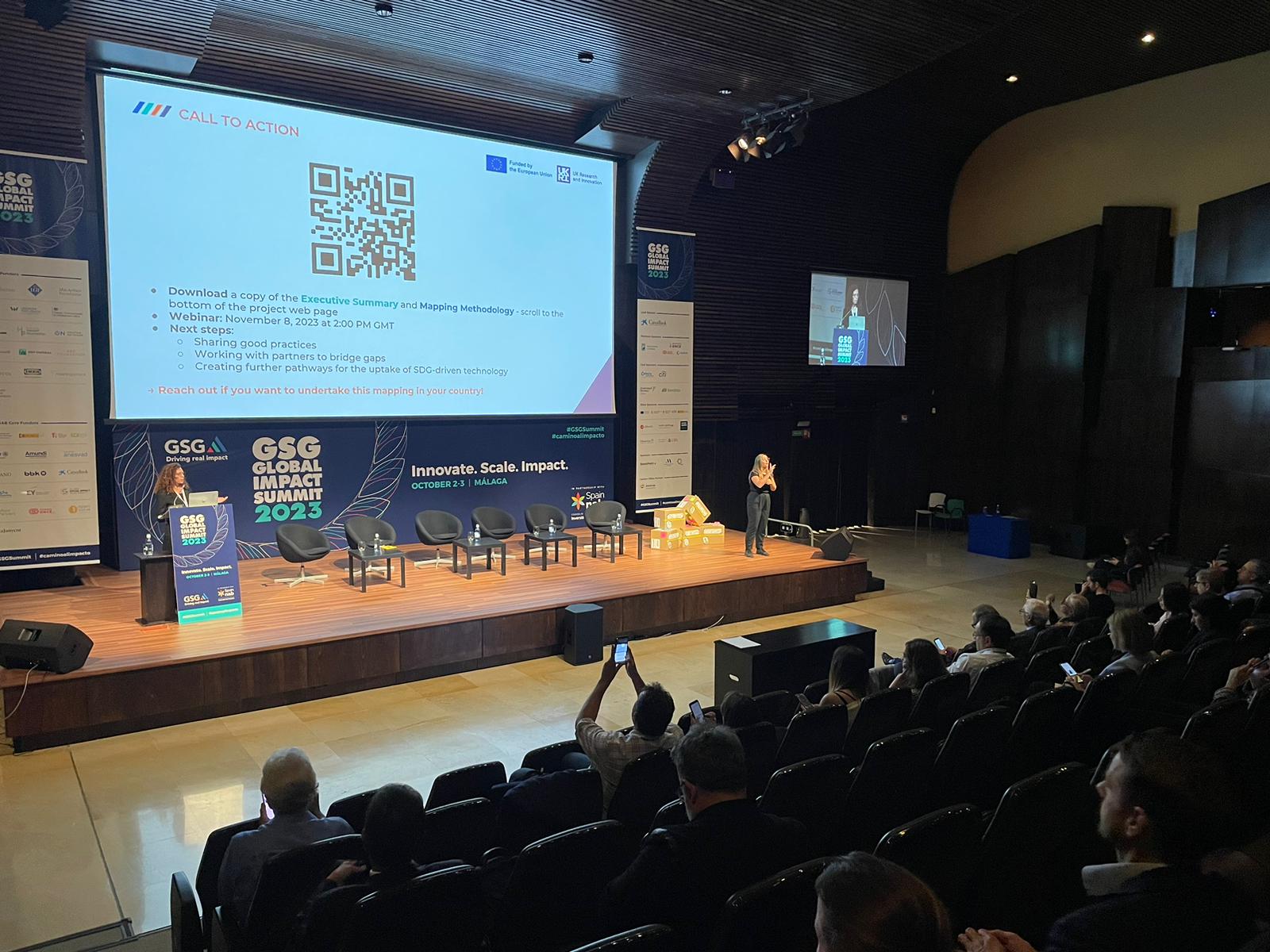
Figure 1 – Gila Norich, Head of Knowledge Development at GSG, presenting the mapping study at the launch session, SDG-Driven Tech Innovation Ecosystems to Accelerate Progress Toward the SDGs, at the GSG Global Impact Summit 2023. Presentation slides are available here.
The launch session commenced with a presentation by Vanessa Kacherginsky from IFIE, highlighting the ‘technology-impact-capital’ triangular mechanism supported by the network facilitation and the significance of our consortium project in developing a roadmap for the creation of next-generation innovation ecosystems catalyzed by technology.
The session featured a panel discussion with ecosystem representatives featured in the mapping study from Israel, Portugal, France, Italy and Lithuania. Moderated by Omri Boral from IMagine IMpact, the panel addressed the opportunities and challenges in scaling impact through technology and strategies to accelerate funding and alignment with SDG-related challenges and solutions, particularly in the context of limited impact investment in technology.
Highlights from the panel included:
- Vanessa Kacherginsky from IFIE (Israel) stressed the need for government and investors to collaboratively identify and address needs and challenges while tailoring solutions for maximum impact.
- Greta Monstavice from Katalista Ventures (Lithuania) observed that environment-focused tech solutions notably exhibit more growth, given that countries, especially in the Global North, face similar environmental challenges, from her acceleration experience of impact startups.
- Margarida Anselmo from MAZE (Portugal) underlined the increasing presence of SDGs and technology in top universities in Portugal.
- Martina Mettgenberg from FAIR (France) noted that the French ecosystem benefits significantly from government initiatives and regulations, exemplified by the 90/10 funds that require a 10 percent investment into social organisations and enterprises.
- Filippo Montesi from SIA (Italy) urged to rethink how technology is developed, stressing that a mere focus on increasing investment is insufficient and could result in the deterioration of societal equality through technology development.
The session closed with a remark by Sir Ronald Cohen, President of GSG, emphasizing the pivotal role of government incentives in shaping the transformative potential of businesses that incorporate social impact into their business models. As one of the pioneers of both the venture capital and impact investing industries, having Cohen speak at the official launch event presented a distinctive opportunity to bridge the realms of commercial tech investing and the imperative for venture capitalists to increase their commitments to impact investments.
“Entrepreneurs are the actors who will drive the impact revolution and bring disruptive models to the forefront of sustainable development,” said Cohen.
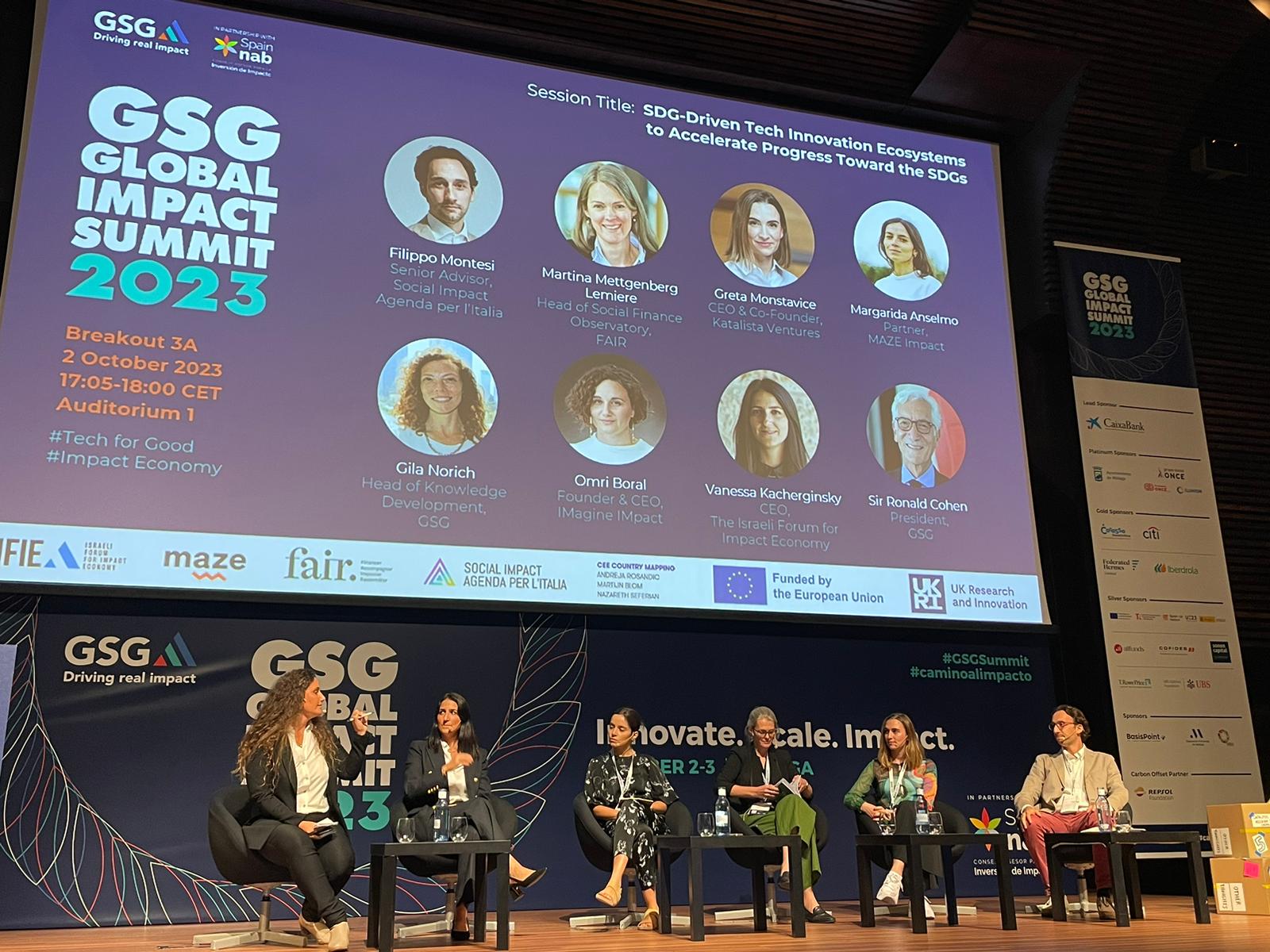
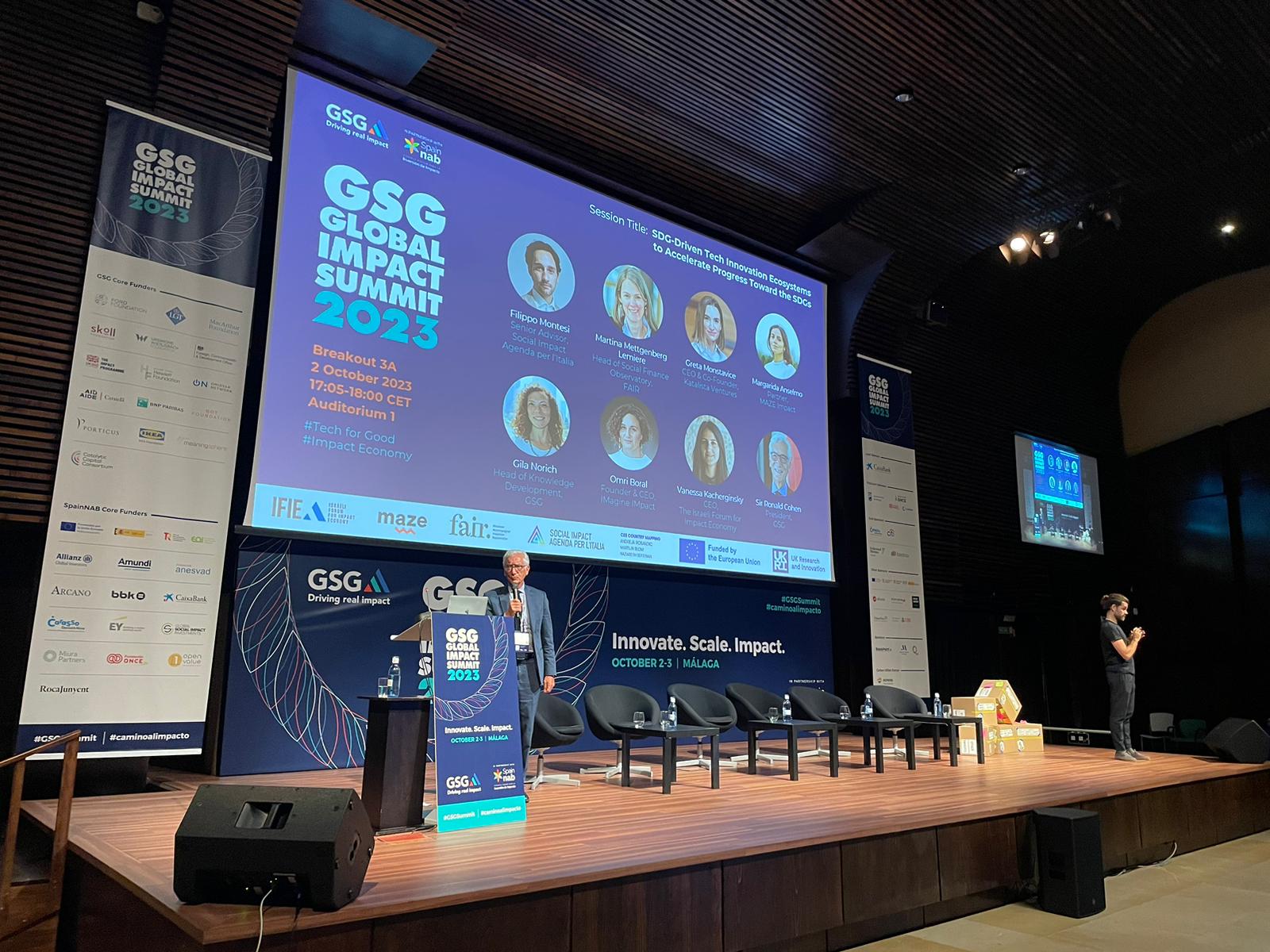
Figure 2 – Panel discussion as part of a launch session, SDG-Driven Tech Innovation Ecosystems to Accelerate Progress Toward the SDGs (Left); and Sir Ronald Cohen delivering a closing remark (Right) at the GSG Global Impact Summit 2023.
More details of each ecosystem’s landscapes are available in the Executive Summary.
IFIE (Israel NAB)
In preparation for the GSG Global Impact Summit 2023, IFIE organised and facilitated a panel discussion looking at the SDG tech ecosystem in diverse regions. During the summit, the panel session, Tech-Innovation: Insights from Varied Ecosystems and Geographies, explored the role of innovative technology in advancing sustainable impact across Southeast Asia, Sub-Saharan Africa, Israel, and the EU countries with the respective speakers.
As a moderator, Stav-Bar Shanny, Director at ATBN/AfriConEU, moderated a conversation about how governments and NGOs support the SDG tech ecosystem and what is the role of impact investors in promoting innovation.
Jonathan Menuhin, CEO of Israel Innovation Institute, represented the Israel ecosystem and shared his insights into operating six innovation communities specialising in specific technologies, collaborating with the Israeli government to bridge the gap between the demand for innovation and the current supply chain. The Israel Innovation Institute is one of the best practices case studies featured in our SDG Mapping Study, as a good example of a Market Facilitator in SDG-driven tech innovation ecosystems.
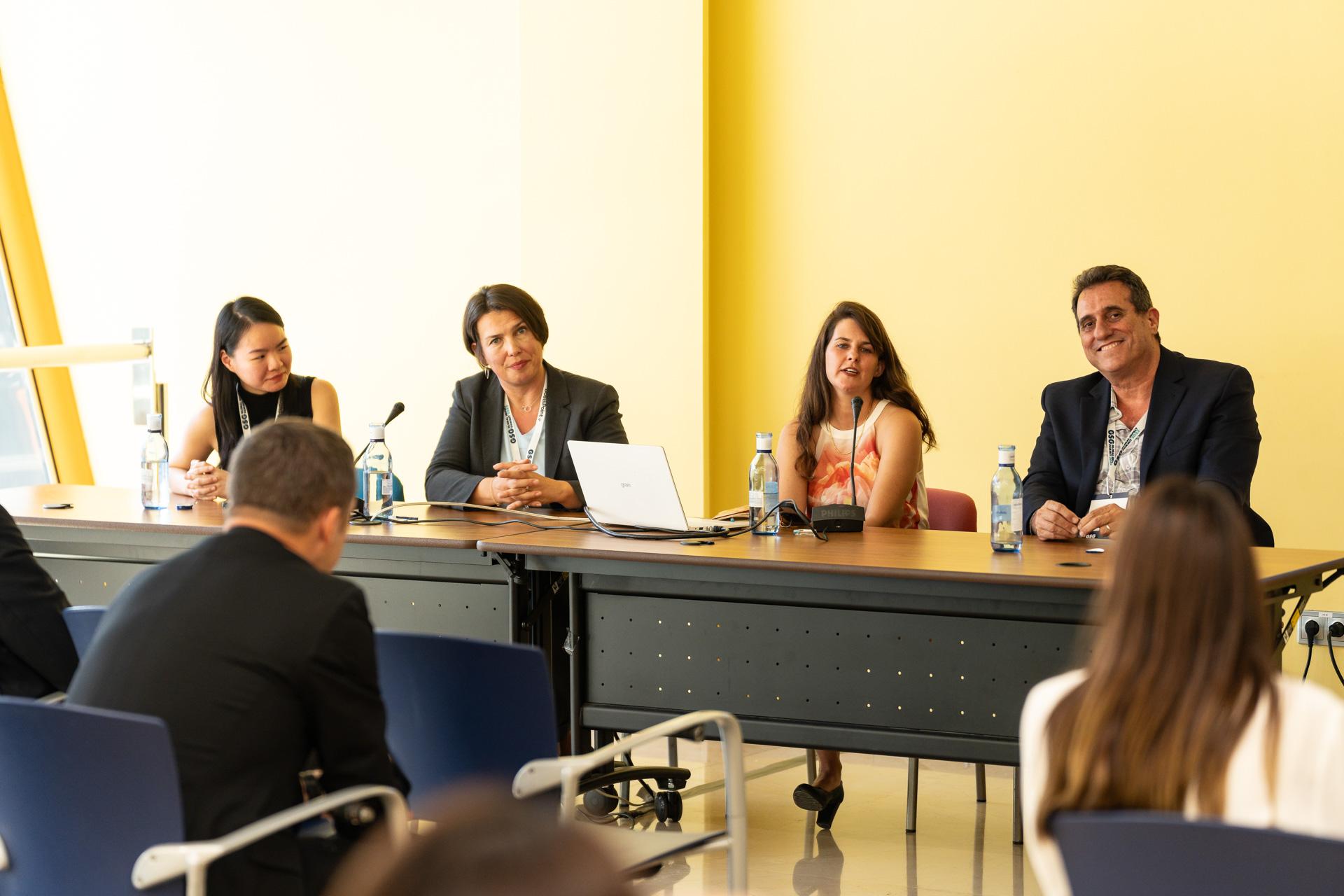
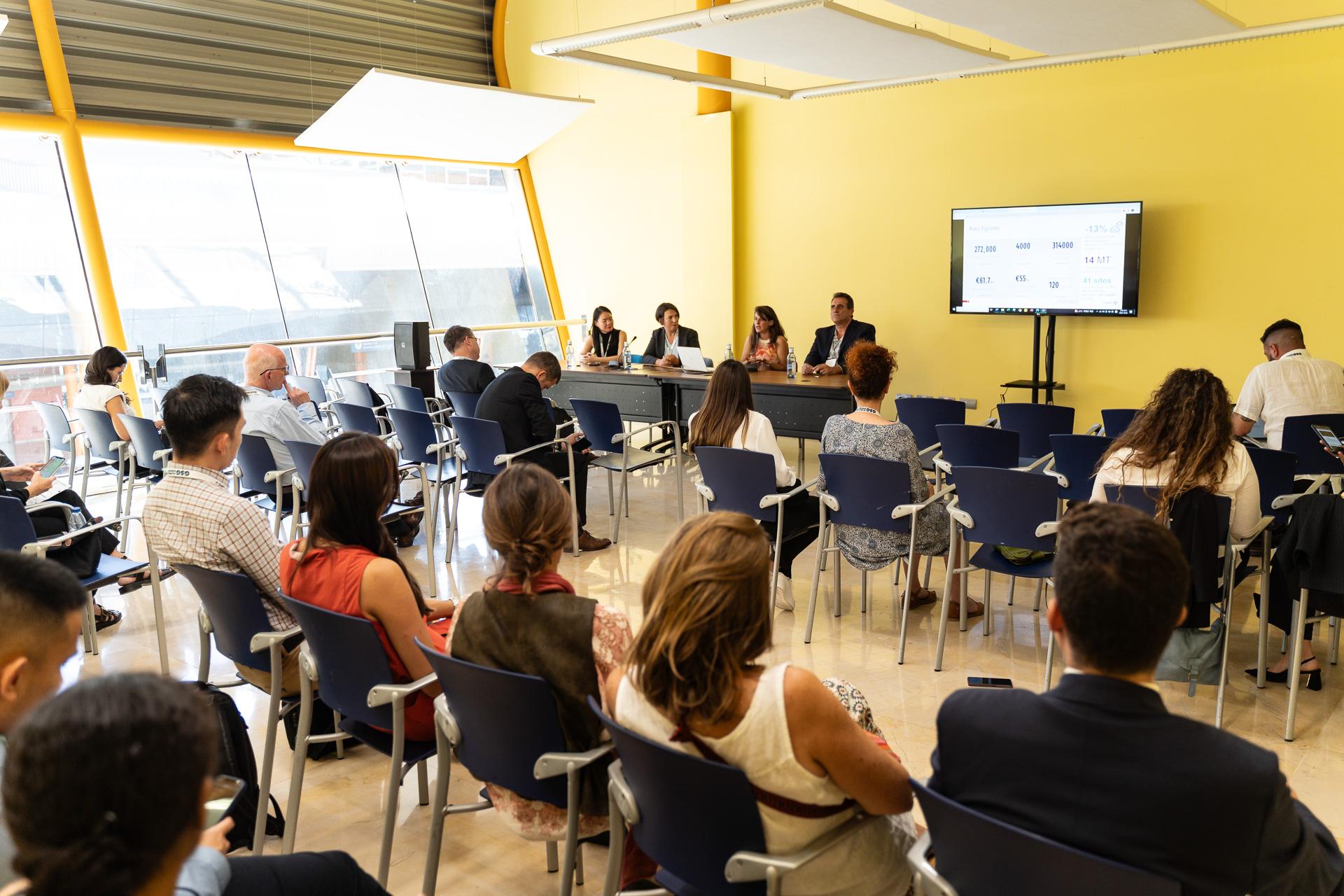
Figure 3 – Panel discussion titled “Tech-Innovation: Perspectives from Diverse Ecosystems and Geographies” during the GSG Global Impact Summit 2023.
MAZE (Portugal NAB)
Activity Update
The focus of MAZE’s work over the last few months has been on collaborating with the project partners to structure, organize, and deliver the project launch session and workshop at the GSG Global Impact Summit 2023 in Malaga.
Maze has collaborated with Omri Boral from IMagine IMpact in structuring and facilitating a 1-hour workshop on the theme of Collaborating to strengthen impact-tech ecosystems in service of the SDGs. The workshop gathered more than 30 participants and enabled roundtable discussions covering best practices, challenges and needs focused on specific topics on the different ways in which technology and innovation can be used to strengthen and advance impact economies. The discussion topics included:
- Impact-tech: startups generating profits & impact through tech innovation
- Digital solutions to scale efficiency of NGOs & public organizations
- Tech training & employment as a tool to drive social and economic mobility
- Investment models driving tech for impact
- Catalytic capital in the mission to implement Impact tech
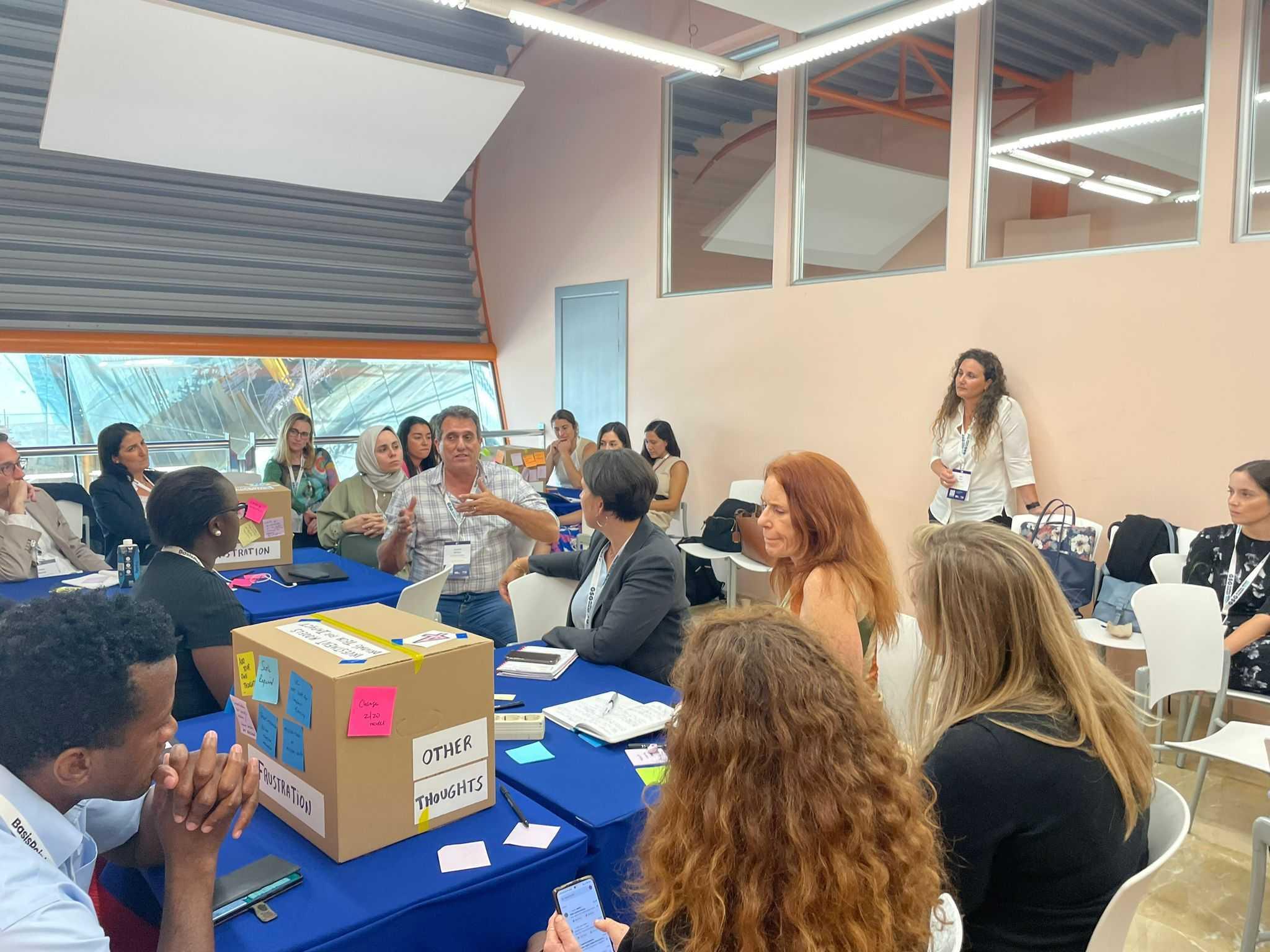
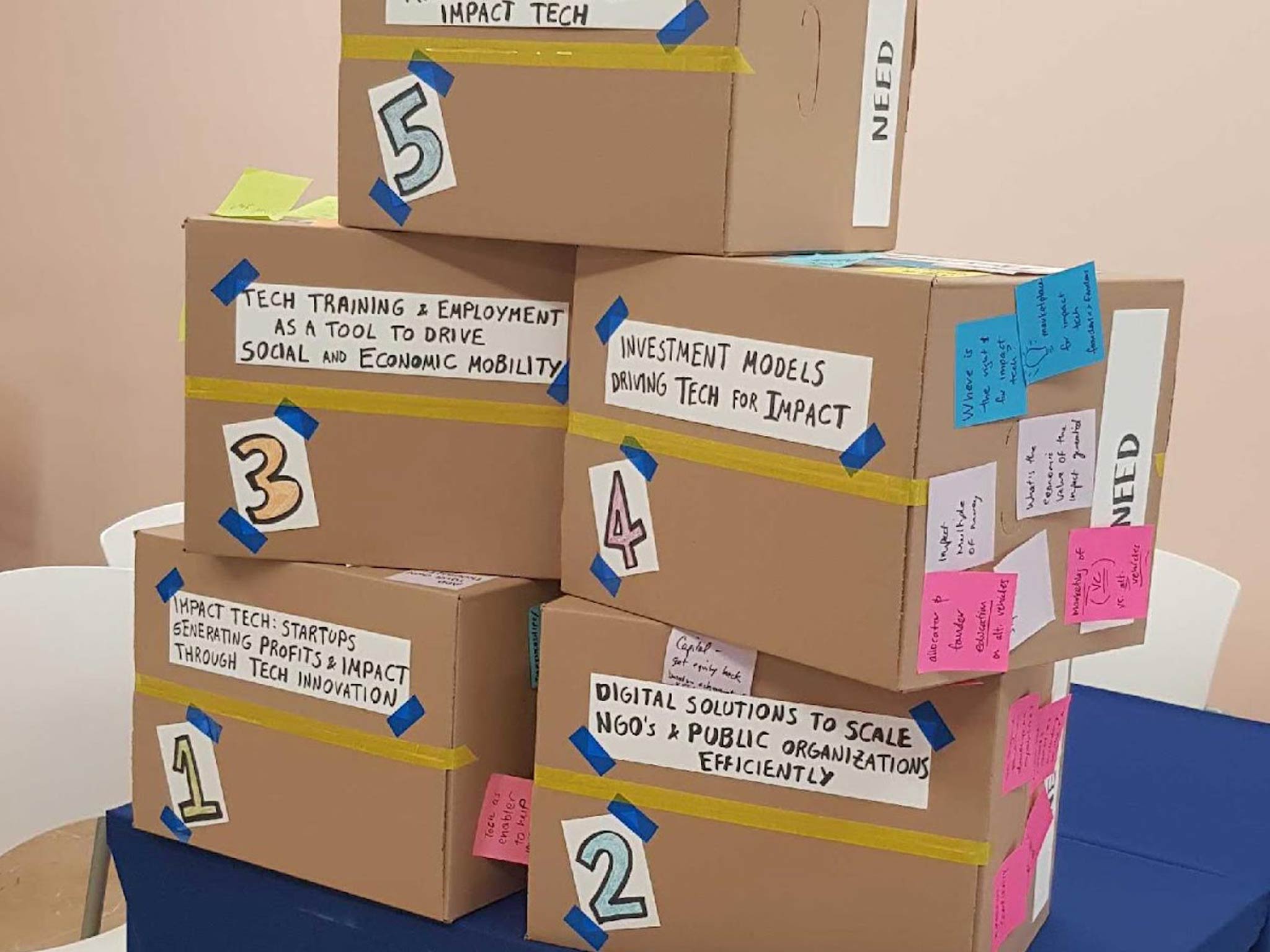
Figure 4 – The consortium partners-led workshop, Collaborating to strengthen impact-tech ecosystems in service of the SDGs, at the GSG Global Impact Summit 2023.
SDG-related news from the Portuguese Ecosystem
At the end of September, the Global Enabling Sustainability Initiative (GeSI) hosted the Digital With Purpose Global Summit 2023 in Lisbon. DWP has a mission to put innovation and digital solutions at the core of the digital agenda to prove that digital is key to tackling the most pressing sustainable challenges. This event brings together companies, public entities, and central and local governments, to showcase the benefits of digital and sustainable solutions.
Blue Bio Value Ideation was launched this week, on October 16th. This 5-week programme aims to support innovative R&D projects that sustainably use marine bioresources. With the guidance of business mentors, participants will be equipped to address technology transfer challenges and empowered to transform blue biotechnology research into viable projects. The program is promoted by the Oceano Azul Foundation and the Calouste Gulbenkian Foundation and is implemented by Maze Impact.
Web Summit will be back in Lisbon in November. This annual 3-day event brings together 70,000+ people from 160+ nationalities, 2,300+ startups, and 1,000+ speakers. In this event, policymakers, heads of state, startup founders, and CEOs of technology companies will discuss new paths for redefining the tech industry. This event is not SDG at its core. However, sustainability topics will be at the centre of its agenda.
Next Steps / Plans
In the upcoming months, Maze Impact will continue to collaborate with the consortium partners to disseminate the report and associated outputs and to promote the development of SDG-driven Tech Ecosystems in Europe.
FAIR (France NAB)
The French ecosystem has been bustling with a series of impactful events since June 2023. Notably, France Digitale organized its annual gathering of the tech ecosystem in Paris, while Mouvement Impact France UEED convened on August 30 under the theme of ‘Towards an economy of peace’.
LinkedIn’s list of the 20 most promising start-ups reveals that nearly 30% of them are focused on social and green initiatives, including companies like green-got, moka-care, sweep, Verkor, greenly, and umiami. Furthermore, in terms of the number of investment deals over the last three years, Charlie Perreau from Les Echos used Pitchbook to identify the most active investors: BPI France (607), Kima Ventures (271), Super Capital (105), AngelSquare (92) and Founders Future (75).
Beyond these recent developments, several noteworthy events hosted by impact tech leader organizations in the French ecosystem are on the horizon as follows:
- French Tech’s 10-Year Anniversary, 16-22 October
- Impact Day hosted by France Digitale, 23 November
- Imagine Summit – l’innovation verteuse hosted by Le Poool et La French Tech Saint Malo Rennes, 7 Dec 2023
Social Impact Agenda per l’Italia (SIA) (Italy NAB)
In recent weeks, the momentum of Sustainable Development Goals (SDGs) has surged within the Italian ecosystem. On October 17, SIA and ET Group co-organized an event titled, “ESG-branded Impact – Market, rules and frontiers of impact investing in Italy” as part of Salone.SRI 2023 Rome, a major national event on socially responsible investments in Italy.
The event was an opportunity for the NAB to share the main highlights from the GSG Global Impact Summit 2023 in Malaga, with an eye toward the upcoming 2024 Italian G7 Presidency. At the opening, Giovanna Melandri, President of SIA and GSG Ambassador, launched an urgent call to attract private investments aimed at bridging the estimated $3.7 trillion annual gap in SDG financing.
Moreover, the event featured insights from the Impact Investing Outlook 2023, an Italian market sizing study led by Tiresia–Polimi, a research center based in the School of Management of the Polytechnic University of Milan, in collaboration with SIA and EVPA. This study highlighted areas where impact investments are more prominent, particularly within SDG 1 and SDG 8.
Event attendees, including representatives from the financial and institutional funds ecosystem as well as from the EU and national policymaking arena, presented their commitment and ongoing initiatives while highlighting priorities and constraints.
Key discussions revolved around the necessity for the Italian impact investment ecosystem to focus on key developments such as enhancing open data availability, supporting SMEs, and promoting engagement at all levels. These actions are essential to accelerate progress and bridge the significant gap in achieving SDG-related targets.
In fact, according to the recently published “Italy and the Sustainable Development Goals” by ASviS (Italian Alliance for the Sustainable Development), the progress of the 2030 Agenda in Italy – and even beyond – faces significant delay. At the current pace, it is estimated that full achievement may only be reached for 8 out of the 33 SDG-related targets. Nevertheless, the report underscores that urgent measures and policy reforms can help to partially catch up.
To actively encourage and guide the financial and social innovation ecosystem in the adoption and implementation of SDGs-oriented approaches and practices across all levels, SIA reaffirms its unwavering commitment. Highlights and practices learnt from the GSG Global Impact Summit 2023 will be of great inspiration and support to the Italian ecosystem.
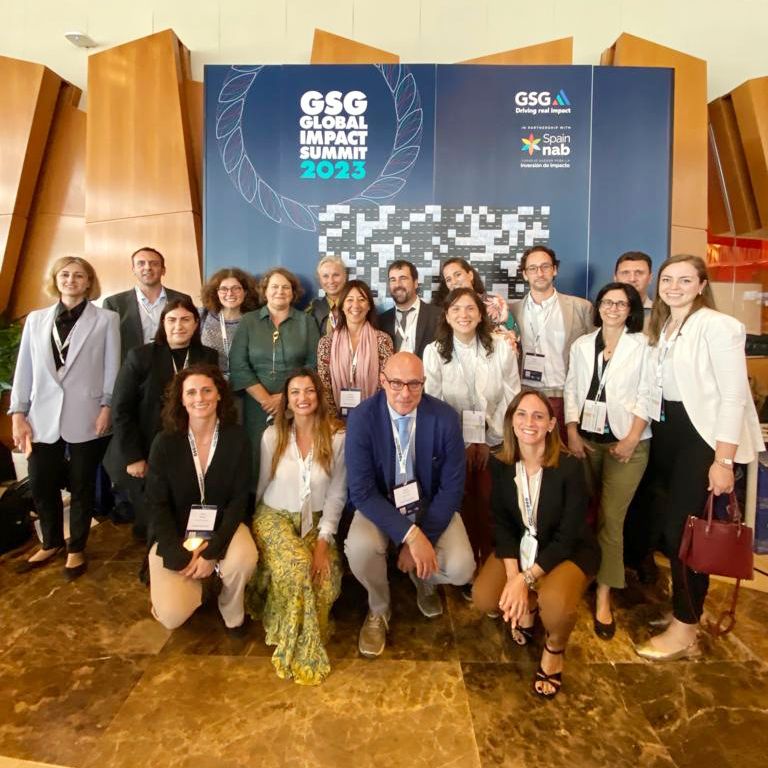
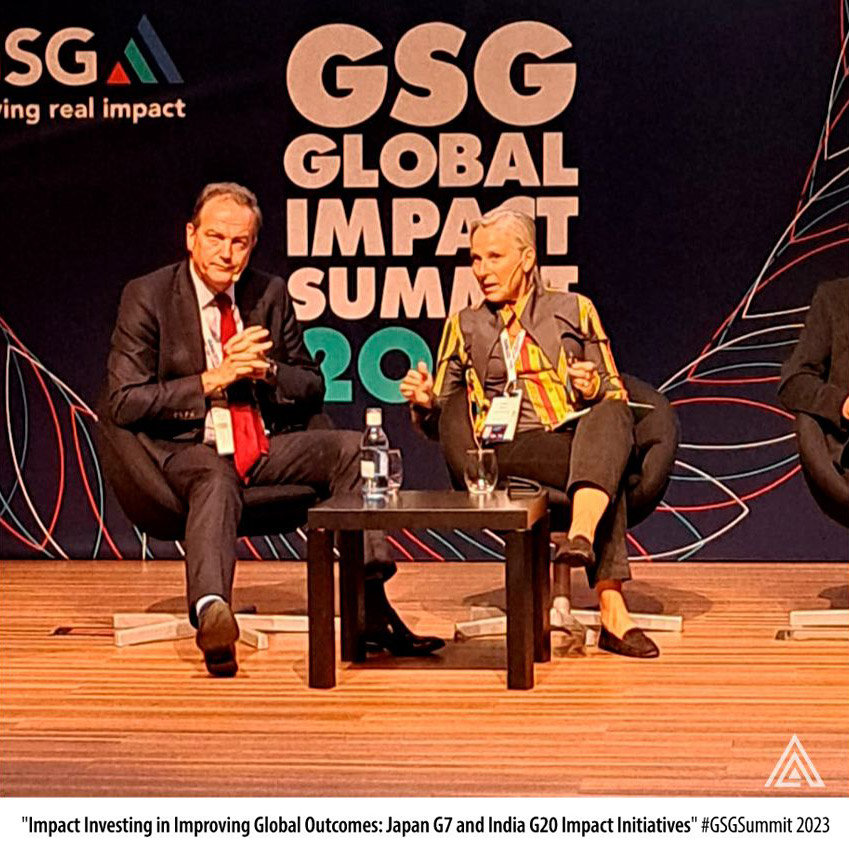
Figure 5 – Italian ecosystem delegation (Left); and Giovanna Melandri, President of SIA and GSG Ambassador speaking (Right) at the GSG Global Impact Summit 2023.
In particular, the SDG-driven Tech Innovation Ecosystem Building Blocks Framework, presented in Malaga will be at the very centre of the SIA coming months’ agenda. In this regard, our national agenda of workshops is currently under construction to present the Framework to a variety of communities and local ecosystems in Italy.
PROJECT PARTNERS & SPONSORS




The consortium’s work is generously supported by a grant from the European Commission through its Horizon 2021-2027 European Innovation Ecosystems (EIE) initiative.
DISCLAIMER
Funded by the European Union. Views and opinions expressed are however those of the author(s) only and do not necessarily reflect those of the European Union or [name of the granting authority]. Neither the European Union nor the granting authority can be held responsible for them.

